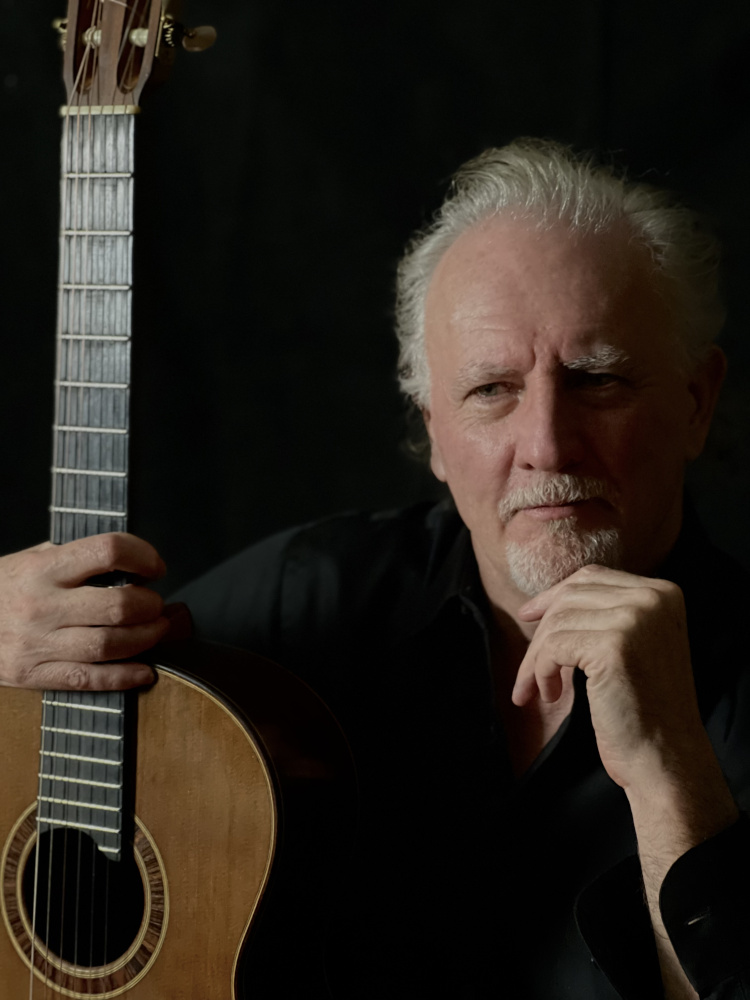MCR Profiles:
Stanley Yates, Guitar
How did a working-class boy from a twelfth-century town, who survived an early life of personal and parental illness and foster homes, end up with stunning accolades for international performances, for over twenty published works, and with a decorated doctorate from a university in Texas? And how did a largely self-taught young man from the North of England end up here, a highly accomplished hidden treasure in the South of the United States? On a Sunday afternoon in September, guitarist Stanley Yates and I had a delightful and far-ranging conversation.
Technical perfection, tonal purity and a considered objectivity are all
perfectly placed
(Den Bosch, The Netherlands)
Stanley Yates chose the guitar at the age of twelve for the loftiest of reasons: his best friend got one, so he got one, too. As an asthmatic child, he often missed school, but his early education in music and movement and singing in school assemblies fused with memories of seeing the Beatles from nearby Liverpool on TV, watching Disney’s iconic Fantasia, and listening to classical music on radio and in motion pictures, enhanced his musical foundations.
His skill on the guitar progressed so quickly that he was already in the midst of the first stage of his performance career when he entered university in Liverpool. Liverpool is often painted as a bleak backwater port town, but Yates remembers it as a vibrant city with its own bohemian section, a city that had acknowledged and moved forward from its history as a slave-trading post and its historical relationship with Yates’ home in Preston, Lancashire, which once housed cotton mills.
He started his university education with an eye toward a physics major, but his blossoming music career urged him on in the city where he met his wife. On and on he performed, delighting in the opportunity to share his zeal for music with audiences all over Europe.
...instinct and brilliant technique with the most refined musical and
musicological preparation
(Milan, Italy)
Once, during a set of performances in the U.S., his wife’s birthplace, Yates performed in Dallas. The head of the guitar program at what is now known as the University of North Texas was in the audience. Afterwards, Yates—then in his thirties and beginning a family—began to discuss a more stable existence than as journeyman recitalist. The head invited him to consider the doctoral program with a full fellowship. And at that, the second half of his life began.
Putting performance on the back burner, he completed his studies, and was hired as a professor at Austin Peay. Financial necessity initiated the second stage of his performance career, the stage he refers to as “super professional”: doing lots of concerts in lots of venues to earn lots of money. Combining experiences from his travels with his teaching, he began to amass notebooks of ideas filling hundreds of pages. Those notebooks, compiled approximately ten years ago, launched the third stage of his career as pedagogue, because he has always enjoyed “getting ideas down in a comprehensible fashion.”
He sticks to the grade better than any other anthology I know …. includes a lot of
less well-known repertoire … [that] are a real pleasure to play.
(Classical Guitar Delcamp)
Performing, though still an active part of Yates’ life, became more selective. Two of the most memorable venues were in Brazil, with own its rich history of guitar music, and Bangladesh, where Western music was virtually unknown. During this period, he thoughtfully alternated between publishing arrangements of music in great demand, like Bach and Vivaldi, with editions of lesser-known historical figures (Francesco Carulli) and anthologies of modern composers (Štěpán Rak). He sees his highly regarded two-volume set, Classical Guitar Technique from Foundation to Virtuosity as writing “letters for myself when I was 16.” As we dug deeper into his motivation, it became clear that Yates takes great satisfaction in advocating for his instrument and its repertoire. “We don’t have 32 Beethoven sonatas,” he notes, but points out the guitar’s greater breadth of strong repertoire with virtuoso pieces dating from the 16th-century, long before the piano existed.
…a phenomenal achievement, a worthy successor to the great methodological authors
of the guitar.
(Graham Wade, Classical Guitar Magazine)
As a parallel to his own three-stage career, Yates categorizes the guitar’s evolutionary stages as starting in the Renaissance when plucked string pieces were written by players, to the “second Renaissance” of the guitar when non-guitarist composers with strong reputations like Manuel de Falla and Igor Stravinsky began to write for the guitar. Now, one of his most recent anthologies features the third Renaissance where respected performers like Leo Brouwer, who are also highly trained as composers have raised guitar repertoire to new heights.
It is nice to have music from contemporary guitarist[s]… it is fun to try new ideas…
I am very glad I got this.
(Amazon)
In his upcoming program, Yates traces guitar history from a lasting figure of the English Renaissance, John Dowland. Dowland, whose melancholy demeanor led to the epigraph: semper Dowland, semper dolens [Dowland is always down], was a loyal proponent of Catholicism in opposition to the Church of England, founded by King Henry VIII. It’s interesting that Preston, Yate’s hometown, also fought to maintain its Catholic roots, becoming one of the last holdouts to the C of E. These days, Preston is better known for its soccer stadium, the world’s oldest in continuous use.
Dowland’s famed Lachrymae [“Flow my Tears”], a slow dance known as a “pavan,” survives as one of the greatest hits of its day continuing its influence on musicians like 20-century composer, Benjamin Britten, who quoted the tune; as recently as 2006, a British electronica group did as well.
Yates’ musical memoir of pivotal moments in guitar history will feature works by de Falla, Villa Lobos, Brouwer, complemented by two works by innovative Czech guitarist-composer, Štěpán Rak. He also plans to play Fernando Sor’s last solo guitar work, Fantaisie élégiaque in E major, one of his perennial favorites. This extended multisectional work includes a funeral march dedicated to Charlotte de Beslay, one of Sor’s students whose talent had attracted the attentions of such luminaries as opera composer Gioachino Rossini. Sadly, she died in childbirth.
Since Yates sees his career as a performer winding down, this elegy may be symbolic of more than just the mourning of a valued student. Everyone is encouraged to enjoy this internationally acclaimed artist at the historic First Presbyterian Church (213 Main St) in Clarksville TN at 3 pm on October 22, 2023. The concert is sponsored by the Clarksville Arts and Heritage Council. Admission and parking are free. For more information, contact: Laurina Lyle at [email protected] or [email protected].
- About the Author
- Latest Posts
Y Kendall is a Stanford-educated musicologist, specializing in dance history who recently earned an MFA in Creative Nonfiction at Columbia University, studying nonfiction writing with Ben Ratliff and Margo Jefferson. Kendall’s diverse works have been published in Alchemy: Journal of Translation, Columbia Journal, Mitos Magazín, The Hunger Mountain Review, and The Salt Collective, among others. Born and raised in Tennessee, Kendall now lives near Nashville, freelancing as a flutist and writer, while caregiving for relatives.



